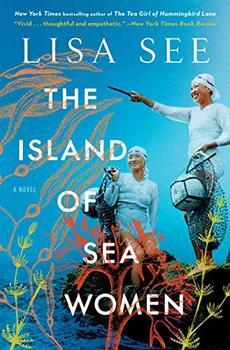Summary | Excerpt | Reading Guide | Reviews | Beyond the Book | Readalikes | Genres & Themes | Author Bio

The sea doesn't belong to anyone, but every collective had assigned diving rights to specific territories: close enough to the shore to walk in, within twenty- to thirty-minutes' swimming distance from land, or accessible only by boat farther out to sea; a cove here, an underwater plateau not too far offshore, the north side of this or that island, and so on. Mi-ja and I listened as the women considered the possibilities. As baby-divers, we hadn't earned the right to speak. Even the small-divers kept quiet. Mother struck down most proposals. "That area is overfished," she told Do-saeng. Another time, she came back with, "Just as on land, our sea fields also follow the seasons. To honor spawning times, conch can't be picked from the ocean floor from July to September, and abalone can't be harvested from October through December. It is our duty to be keepers and managers of the sea. If we protect our wet fields, they will continue to provide for us." Finally, she made her decision. "We'll row to our underwater canyon not far from here."
"The baby-divers aren't ready for that," one of the grandmother-divers said. "They aren't strong enough, and they haven't earned the right either."
Mother held up a hand. "In that area, lava flowed from Grandmother Seolmundae to form the rocky canyon. Its walls provide something for every ability. The most experienced among us can go as deep as we want, while the baby-divers can pick through those spots close to the surface. The Kang sisters will show Mi-ja what to do. And I'd like Do-saeng's daughter, Yu-ri, to watch over Young-sook. Yu-ri will soon become a small-diver, so this will be good training for her."
Once Mother explained, there were no further objections. Mothers are closer to the women in their diving collective than they are to their own children. Today, my mother and I had begun to form that deeper relationship. Observing Do-saeng and Yu-ri together, I could see where my mother and I would be in a few years. But this moment also showed me why Mother had been elected chief. She was a leader, and her judgment was valued.
"Every woman who enters the sea carries a coffin on her back," she warned the gathering. "In this world, in the undersea world, we tow the burdens of a hard life. We are crossing between life and death every day."
These traditional words were often repeated on Jeju, but we all nodded somberly as though hearing them for the first time.
"When we go to the sea, we share the work and the danger," Mother added. "We harvest together, sort together, and sell together, because the sea itself is communal."
With that final rule stated—as though anyone could forget something so basic—she clapped her hands twice on her thighs to signal that the meeting had ended and we needed to get moving. As my grandmother and her friends filed outside to work on the shore, Mother motioned to Yu-ri to help me get ready. Yu-ri and I had known each other our entire lives, so naturally we were a good match. The Kang sisters didn't know Mi-ja well and probably wanted to keep their distance from her. She was an orphan, and her father had been a collaborator, working for the Japanese in Jeju City. But whether or not the Kangs liked it, they had to do what my mother ordered.
"Stand close to the fire," Yu-ri told me. "The faster you get undressed and ready, the faster we'll be in the water. The sooner we go into the water, the sooner we'll return here. Now, follow what I do."
We edged closer to the flames and stripped off our clothes. No one showed any inhibitions. This was like being together in the communal bath. Some of the younger women were big with babies growing in their bellies. Older women had stretch marks. Even older women had breasts that sagged from too much living and giving. Mi-ja's and my bodies showed our age too. We were fifteen years old, but the harshness of our environment—little food, hard physical work, and cold weather—meant that we were as skinny as eels, our breasts had not yet begun to grow, and just a few wisps of hair showed between our legs. We stood there, shivering, as Yu-ri, Gu-ja, and Gu-sun helped us put on our three-piece water clothes made from plain white cotton. The white color would make us more visible underwater, and it was said to repel sharks and dolphins, but, I realized, the thinness of the fabric would do little to keep us warm.
Excerpted from The Island of Sea Women by Lisa See. Copyright © 2019 by Lisa See. Excerpted by permission of Scribner. All rights reserved. No part of this excerpt may be reproduced or reprinted without permission in writing from the publisher.
Your guide toexceptional books
BookBrowse seeks out and recommends the best in contemporary fiction and nonfiction—books that not only engage and entertain but also deepen our understanding of ourselves and the world around us.